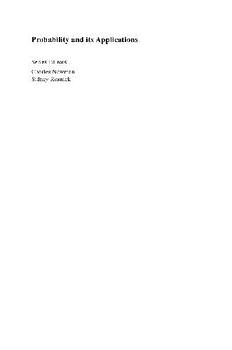Table Of ContentProbability and its Applications
SeriesEditors
CharlesNewman
SidneyResnick
Martin Jacobsen
Point Process Theory
and Applications
Marked Point and
Piecewise Deterministic
Processes
Birkha¨user
Boston Basel Berlin
• •
MartinJacobsen
UniversityofCopenhagen
InstituteofMathematicalSciences
DepartmentofAppliedMathematicsandStatistics
5Universitetsparken
DK-2100CopenhagenØ
Denmark
MathematicsSubjectClassification(2000):60G07,60G44,60G55,60G57,
60H05,60J25,60J35,60J75,60J80,60K25,62N01,91B28,91B30(primary);
60G30,60G40,60G51,60J57,60K15(secondary)
LibraryofCongressControlNumber:2005934409
ISBN-100-8176-4215-3 eISBN0-8176-4463-6
ISBN-13978-0-8176-4215-0
Printedonacid-freepaper.
c2006Birkha¨userBoston
(cid:1)
Allrightsreserved.Thisworkmaynotbetranslatedorcopiedinwholeorinpartwithoutthewrit-
tenpermissionofthepublisher(Birkha¨userBoston,c/oSpringerScience BusinessMediaInc.,233
+
SpringStreet,NewYork,NY10013,USA),exceptforbriefexcerptsinconnectionwithreviewsor
scholarlyanalysis.Useinconnectionwithanyformofinformationstorageandretrieval,electronic
adaptation,computersoftware,orbysimilarordissimilarmethodologynowknownorhereafterde-
velopedisforbidden.
Theuseinthispublicationoftradenames,trademarks,servicemarksandsimilarterms,evenifthey
arenotidentifiedassuch,isnottobetakenasanexpressionofopinionastowhetherornottheyare
subjecttoproprietaryrights.
PrintedintheUnitedStatesofAmerica. (TXQ/EB)
987654321
www.birkhauser.com
Contents
Preface .......................................................... ix
PartI Theory
1 Introduction.................................................. 3
1.1 Overview ................................................... 3
1.2 Conditionalexpectationsandprobabilities........................ 5
2 SimpleandMarkedPointProcesses.............................. 9
2.1 ThedefinitionofSPPsandMPPs ............................... 9
2.2 Countingprocessesandcountingmeasures ....................... 11
3 ConstructionofSPPsandMPPs................................. 17
3.1 CreatingSPPs ............................................... 17
3.2 CreatingMPPs............................................... 21
3.3 FromMPPstoPDPs .......................................... 25
4 CompensatorsandMartingales ................................. 33
4.1 Hazardmeasures ............................................. 33
4.2 Adaptedandpredictableprocesses .............................. 41
4.3 Compensatorsandcompensatingmeasures ....................... 50
4.4 Intensityprocesses ........................................... 63
4.5 Thebasicmartingales ......................................... 68
4.6 Stochasticintegralsandmartingales ............................. 77
4.7 Itoˆ’sformulaforMPPs ........................................ 85
4.8 Compensatorsandfiltrations ................................... 94
5 LikelihoodProcesses........................................... 103
5.1 Thestructureofthelikelihood..................................103
5.2 ConstructingRCMsfrommartingales ...........................110
vi Contents
6 Independence................................................. 119
6.1 Independentpointprocesses....................................119
6.2 Independentincrements,Le´vyprocesses .........................123
7 PDMPs ...................................................... 143
7.1 Markovprocesses ............................................143
7.2 Markovchains ...............................................146
7.3 ConstructionandbasicpropertiesofPDMPs......................152
7.4 ExamplesofPDMPs..........................................163
7.4.1 Renewalprocesses .....................................163
7.4.2 ProcessesderivedfromhomogeneousPoissonmeasures......165
7.4.3 APDMPthatsolvesanSDE.............................165
7.5 ThestrongMarkovproperty ...................................167
7.6 Itoˆ’sformulaforhomogeneousPDMPs ..........................170
7.7 Thefullinfinitesimalgenerator .................................177
7.8 Stationarity..................................................184
7.9 LikelihoodprocessesforPDMPs ...............................203
PartII Applications
8 SurvivalAnalysis.............................................. 217
8.1 Independentsurvivaltimes,right-censoring.......................217
8.2 TheCoxregressionmodel .....................................225
9 Branching,Ruin,Soccer ....................................... 231
9.1 Abranchingprocess ..........................................231
9.2 Ruinprobabilities ............................................235
9.3 Thesoccermodel ............................................243
10 AModelfromFinance ......................................... 247
10.1 Themodel ..................................................247
10.2 Portfoliosandself-financingstrategies...........................251
10.3 Arbitrageandmartingalemeasures..............................257
10.4 Contingentclaimsandpricing ..................................267
11 ExamplesofQueueingModels .................................. 277
11.1 TheGI/G/1queue ............................................277
11.2 Networkmodels .............................................287
PartIII Appendices
A DifferentiationofCadlagFunctions .............................. 297
B Filtrations,Processes,Martingales ............................... 301
Contents vii
BibliographicalNotes .............................................. 309
References ....................................................... 315
NotationIndex.................................................... 321
Index............................................................ 325
Preface
Thebookaimsatpresentingadetailedandmathematicallyrigorousexpositionofthe
theoryandapplicationsofaclassofpointprocessesandpiecewisedeterministicpro-
cesses.Theframeworkissufficientlygeneraltounifythetreatmentofseveralclasses
ofstochasticphenomena:pointprocesses,MarkovchainsandotherMarkovprocesses
in continuous time, semi-Markov processes, queueing and storage models, and like-
lihood processes. There are applications to finance, insurance and risk, population
models,survivalanalysis,andcongestionmodels.Amajoraimhasbeentoshowthe
versatilityofpiecewisedeterministicMarkovprocessesforapplicationsandtoshow
howtheymayalsobecomeusefulinareaswherethusfartheyhavenotbeenmuchin
evidence.
Originallytheplanwastodevelopagraduatetextonmarkedpointprocessesin-
dexed by time which would focus on probabilistic structure and be essentially self-
contained. However, it soon became apparent that the discussion should naturally
include a traditional class of continuous time stochastic processes constructed from
certain marked point processes. This class consists of ‘piecewise deterministic pro-
cesses’; that is, processes with finitely many jumps on finite time intervals which,
roughlyspeaking,developdeterministicallybetweentherandomjumptimes.Theex-
position starts with the point process theory and then uses this to treat the piecewise
deterministicprocesses.
Throughoutthefocusisconstructive,emphasizingcanonicalversions,whichoften
meansthataprocessisdiscussedrelativetoitsownfiltration,ratherthanwithrespect
to a general and larger filtration to which the process may be adapted. Many of the
mainresultsareprovedwithinthiscanonicalsetting,whichmakesiteasiertodevelop
theproofs.Butofcoursethesemainresultsthenappearonlyasspecialcasesofwell-
established results from ‘the general theory of processes’; even so, we believe that
by treating the canonical setup directly, additional insight into the structure of the
processesisgained.
Among the piecewise deterministic processes those that are Markov are espe-
cially important, and they are also the ones treated most thoroughly in this book.
The pioneering work here was done by Mark Davis and many of his results duly
reappear here—but again, basing everything on marked point process theory leads
x Preface
to a somewhat different approach and to a very general construction of not only
time-homogeneous piecewise deterministic Markov processes (the ones considered
byDavis),butalsoofthosethatarenon-homogeneous.
Thetextisdesignedforadvancedtopicscoursesorself-studybygraduatestudents
who are at least in the fourth year of a European style degree program or at least in
the second year of an American style Ph.D program. The text will also be useful to
researchers specializing in the use of probabilistic models for point processes and
piecewise deterministic processes. A course can easily be fashioned from selected
partsofthebook,andwesuggestChapters2,3,4andSections7.1–Chapter7.This
materialshouldbesupplementedbydiscussionofsomeofthemodelsandapplications
treatedinPartII.
The reader who wishes to master all details of the text will need a background
inmeasure-theoreticprobabilitytheory.Readerswithanarrowerfoundationwillalso
benefitfromreadingthebook.Shortintroductionstoeachchapter,apartfrompoint-
ing to material that is considered essential, also list parts of the text (entire sections,
technicalproofs,etc)thatmaybeomitted.
Acknowledgements
AninitialversionofthistextstartedaslecturenotesforagraduatecourseattheUni-
versity of Copenhagen in 1995–1996 and went through successive revisions while
lecturingatCopenhagen,theUniversityofAarhus(1998)andatChalmersUniversity
of Technology and the University of Gothenburg (1999). Grateful acknowledgement
is made to the University of Aarhus’ Centre for Mathematical Physics and Stochas-
tics(MaPhySto,anetworkfundedbytheDanishNationalResearchFoundation),with
specialthankstoOleBarndorff-Nielsen,thethendirectoroftheCentre.Manythanks
also to Holger Rootze´n for arranging my stay at the Stochastic Centre at Chalmers
UniversityofTechnologyandtheUniversityofGothenburgin1999andforthesup-
portreceivedfromtheCentre.
IamalsomuchindebtedtocolleaguesandstudentsinCopenhagenandelsewhere
forstimulationandfeedbackwhichcontributedmuchtotheimprovementofthetext.I
especiallythankJacobKrabbePedersen,nowattheUniversityofSouthernDenmark,
whovoluntarilyundertookthehugetaskofconvertingthehandwrittenmanuscriptof
theoriginalCopenhagennotesintoLATEX.Mygratitudetohim,BoMarkussenandAn-
dersTolverJensen(bothfromCopenhagen)fortheirmanyinsightfulcomments,ques-
tionsandsuggestions.IamalsoverygratefultoKasperLarsen,presentlyatCarnegie
Mellon,forreading,commentingonandimprovingthesectiononfinance.
Sid Resnick from Cornell University first encouraged me to write a book based
on the MaPhySto lecture notes. I would like to thank him and also the anonymous
reviewerswhoofferedmanyhelpfulsuggestions.Finally,manythanksareduetothe
staffatBirkha¨userBoston,AnnKostantinparticular,fortheirhelpandpatienceduring
theslowprogressofthisproject.
MartinJacobsen Copenhagen,May2005
Point Process Theory
and Applications

